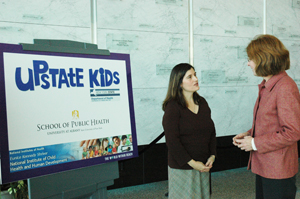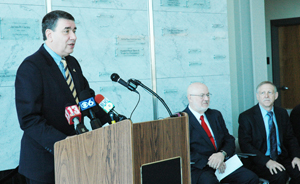Upstate KIDS Program Seeks Early Intervention of Children with Developmental Problems
New York State Dept. of Health, UAlbany partner to provide intervention services through $3.4 million from National Institute of Child Health and Development
Contact(s): Catherine Herman (518) 956-8150
 |
The Upstate New York Infant Development Screening Program will be conducted by researchers at the state Dept. of Health and UAlbany's School of Public Health, who will identify factors that increase the risk for developmental delays and other problems. (Photo Gina Muscato) |
ALBANY, N.Y. (November 19, 2008) -- Parents of newborn children in New York State may soon be asked by state health officials to complete a series of at-home questionnaires about their children�s health and development. The goal is to identify possible risk factors for developmental disorders and conditions. Children thought to be at risk for developmental problems will be referred to State child development specialists for appropriate intervention services.
Called the Upstate New York Infant Development Screening Program (Upstate KIDS), the study will enroll about 6,500 families who recently gave birth or will give birth in New York State, between 2008 and 2009. The study will be conducted by researchers at the New York State Department of Health and the University at Albany School of Public Health, who will analyze birth records and questionnaire results to identify factors that increase the risk for developmental delays and other problems. The researchers will refer children at risk for problems to the New York State Department of Health (NYDOH) Early Intervention Program. The study is funded with $3.4 million from the Eunice Kennedy Shriver National Institute of Child Health and Human Development (NICHD) at the National Institutes of Health.
Families who participate in the Upstate KIDS program will help researchers learn about both normal development and instances in which problems in development occur. The researchers will look at a variety of factors to see if they increase the chances for developmental or other health problems. These factors include advanced maternal age, maternal obesity, a history of infertility treatments, or assisted reproductive technology, where there is still controversy about the long-term effects.
The Principal Investigator for the program is Dr. Charlotte M. Druschel of NYSDOH and assistant professor of Epidemiology and Biostatics at UAlbany's School of Public Health. Collaborating with Druschel will be Erin M. Bell, assistant professor of Epidemiology and Biostatistics at the UAlbany, Dr. Christopher A. Kus, Associate Medical Director, Division of Family Health (NYSDOH), and senior researchers at the NICHD.
"This program is the first of its kind for New York State," said Dr. Richard F. Daines, New York State Commissioner of Health. "Thanks to the support of NICHD we have the opportunity to develop a far-reaching program which will immediately help thousands of families in New York State and help us learn more about child development."
"Through our unique partnership with the New York State Department of Health, we are able to link academic study to the world of public health practice," said Interim President George M. Philip of the University at Albany. "I commend the faculty and staff of UAlbany's School of Public Health and their partners for their efforts to improve the lives of children in New York."
 |
UAlbany Interim President George M. Philip addresses the crowd about the $3.4 million National Institute of Child Health and Human Development grant, which will be used for the Upstate KIDS program. (Photo Gina Muscato) |
"The University at Albany is excited to participate in this noble endeavor," said Philip C. Nasca, Dean, UAlbany School of Public Health. "This infant development screening program will provide valuable insight into the growth of children at a vital stage of development, and offer public health workers a better understanding of how certain health and pregnancy aspects factor into a child's early development."
"The program will help us to identify how a number of maternal and familial factors may impact child development," said Bell. "We can track factors, such as age of the mother, environment, and infertility treatment to formally address how health factors before and during pregnancy may impact early child development. Most importantly, we can identify if children may be in need of specific pediatric services and provide parents with a mechanism for ensuring their children get the help they need."
Parents will be asked to participate in Upstate KIDS for three years by completing an initial questionnaire about the pregnancy, completing an infant development questionnaire that measures their child�s motor and social development at 4, 8, 12, 18, 24, 30, and 36 months of age, and providing information on the child�s growth and medical history. Infants will be enrolled as participants at 3-5 months of age and followed until age 36 months. In addition, when children are 18 and 24 months old, parents will complete the Modified Checklist for Autism in Toddlers (M-CHAT) screening questionnaire. When an enrolled infant has a twin sibling or is part of a set of higher order multiples (e.g. triplets, quadruplets), parents will also have the option of enrolling all of the siblings in the screening program.
UAlbany's School of Public Health serves as the academic anchor of the East Campus, the biotech hub of the university's life sciences research, which includes the Cancer Research Center, home to the Gen*NY*Sis Center for Excellence in Cancer Genomics and the Center for Functional Genomics.
Students and faculty at UAlbany's globally-oriented School of Public Health study the most profound health issues facing us today: the origins of disease such as cancer, the threat of bioterrorism, the spread of HIV/AIDS, and other emerging diseases, the lack of affordable and accessible health care for individuals and families, environmental hazards, substance abuse and social violence, maternal mortality in developing countries, the promises and threats of genetic engineering, and protecting food and water supplies.
Through its partnership with NYSDOH, offers students immediate access to internships at the Health Department, Albany Medical College, and a variety of other public and private health institutions throughout New York.
![]() For more news, subscribe to UAlbany's RSS headline feeds
For more news, subscribe to UAlbany's RSS headline feeds
Educationally and culturally, the University at Albany-SUNY puts "The World Within Reach" for its 18,000 students. An internationally recognized research university with 58 undergraduate majors and 128 graduate degree programs, UAlbany is a leader among all New York State colleges and universities in such diverse fields as public policy, nanotechnology and criminal justice. With a curriculum enhanced by 300 study-abroad opportunities, UAlbany launches great careers. For more information about this globally ranked University, visit www.albany.edu. For UAlbany's extensive roster of faculty experts, visit www.albany.edu/news/experts.shtml.


